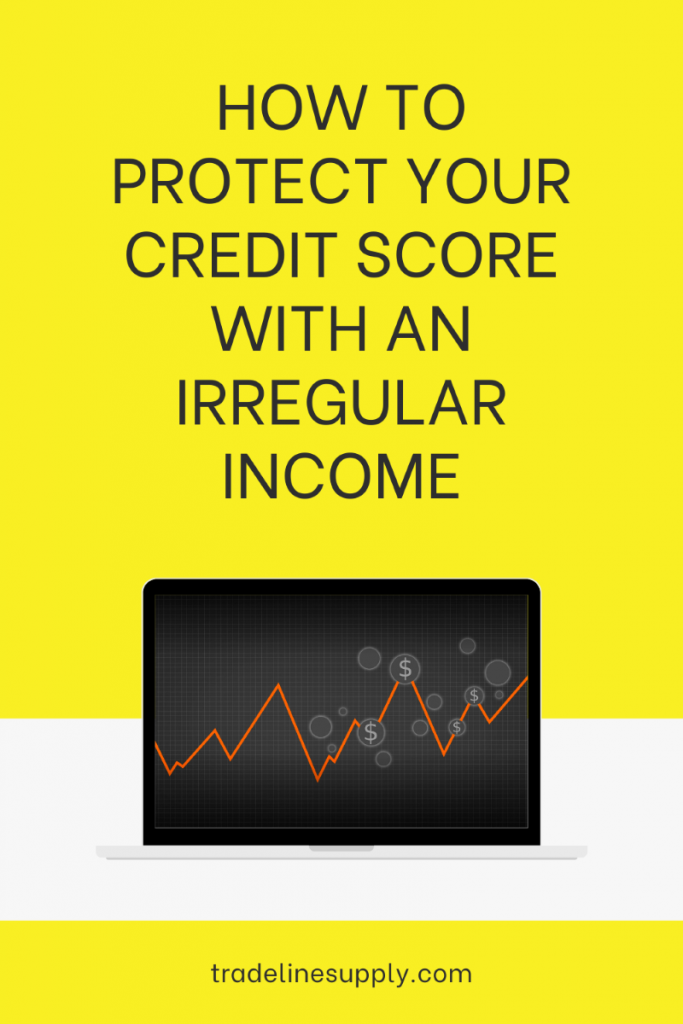 An unpredictable income often comes hand in hand with the freelancer or gig worker life. The freedom and flexibility you have over your work are empowering. But an unpredictable income can make managing your finances a bit more complicated.
An unpredictable income often comes hand in hand with the freelancer or gig worker life. The freedom and flexibility you have over your work are empowering. But an unpredictable income can make managing your finances a bit more complicated.
But if you have the grit it takes to succeed in a flexible work environment, then managing your finances shouldn’t be too difficult. With a little bit of planning, you can map out a strategy to protect your finances and credit scores from the swings of an irregular income.
How Unpredictable Income Can Impact Your Credit
An unpredictable income won’t directly impact your credit. But in an indirect way, the realities of an unpredictable income can negatively impact your credit scores.
Late Payments
When you have an income that swings from glorious highs to dismal lows, it can make budgeting challenging. One of those budgeting challenges is regularly making on-time bill payments when you have low-income months.
A history of late payments will negatively impact your credit scores. That’s because your payment record accounts for 35% of your FICO scores. As the most important factor, on-time payments are a critically important piece of the good credit puzzle.
Credit Utilization
An unpredictable income can lead you to rely more heavily on your credit cards in a low-income month. If you aren’t able to pay off your balance at the end of the month, the balance will start to accrue interest at a fast rate.
As the balance rises, your credit utilization ratios will be affected. Your credit usage accounts for 30% of your FICO scores—it’s the second most important factor considered.
If your credit card balance rises, your overall credit utilization ratio will also rise. For example, let’s say that your credit limit is $10,000, and you have a balance of $4,000. At that point, you’d have a credit utilization ratio of 40%.
Generally, it’s a good idea to keep your credit utilization rate below 20%. Otherwise, this factor could have a negative impact on your credit scores. If you want to get the highest credit scores possible, you’ll want to maintain a utilization rate of less than 10%.
With an unpredictable income, it’s easy to see your credit utilization skyrocket in slow months. So, this will have a negative impact on your credit scores.
Protect Your Credit Scores From an Irregular Income

The good news is that it’s entirely possible to protect your credit scores from an irregular income. Here’s a closer look at the steps you can take to safeguard your credit scores.
Build a Budget
Whether or not you have an irregular income, a budget can help you protect your credit score.
Essentially, a budget maps out what you can spend while considering your financial goals. When you have an irregular income, the importance of careful budgeting cannot be overstated, as it can help you grow a buffer of savings to get you through those months when your cash flow is tight.
We’ll go into more depth about budgeting with a variable income below.
Live Below Your Means
Living below your means is a sound financial principle to follow with any income. But as someone with an unpredictable income, it’s especially important.
When you have an unpredictable income, living below your means allows you to build a safety net for slow months. So, what does this look like in practice?
Let’s say that you earn $75,000 per year. But the income isn’t a regular $6,250 per month. You have some months with an income of $2,500 and others well over $8,000. Instead of setting up your essential monthly spending to use $6,000 per month, consider setting up a budget that has your necessary spending sitting around $4,000 per month.
Spending below your means allows you to save more in good months. As you build up those savings, you can use them to cover your expenses in other months.
The exact breakdown of your spending will depend on your income and risk tolerance. But if you are able to find more affordable options for your big expenses like housing and transportation, you might be able to avoid relying on credit in low-income months.
Create an Emergency Fund
An emergency fund is a key component of a stable financial life. If you have a variable income, an emergency fund is especially important.
When you encounter slow months, an emergency fund is there to help you cover your expenses. Instead of reaching for your credit cards or a personal loan, you can tap into the savings you’ve built for this exact reason.
You can think of an emergency fund as a safety net. For those with an unpredictable income, this safety net is more likely to come in handy along the way. In terms of protecting your credit, you can use an emergency fund to keep up with your payments even if your income is lower for a particular month.
Many experts recommend building an emergency fund that covers three to six months’ worth of expenses. But the amount you choose to save will vary based on your financial situation.
Having savings of any size on hand is better than nothing. Even if you can only set aside $20 per month, make it a point to save that for a rainy day.
If you have a couple of high-income months, then you might decide to create an even bigger emergency fund. Personally, I saved an emergency fund to cover 12 months of expenses before I made the leap into freelancing full time.
So, how much you decide to set aside in an emergency fund is entirely up to you. But building an emergency fund can help you protect your credit in low-income months. 
Lower Your Debt Burden
When you have required monthly debt payments, that can take a serious toll on your budget. As long as those required monthly payments are on the horizon, the pressure to keep up with them will remain.
But what if you could lower your monthly debt payments? That’s a possibility if you start paying off your debts ahead of schedule.
With an irregular income, you might not be able to make progress towards debt repayment every single month. But when you have a high-income month, make the most of it by tackling your outstanding debts.
There are two popular debt repayment methods—the snowball and avalanche methods. With the snowball method, you’ll funnel any funds you have available for debt repayment toward your smallest debt. Once you pay off the smallest debt, you’ll move on to the next largest debt until they are all gone.
The other popular option is the avalanche method. In this case, you would funnel extra funds towards the debt with the highest interest rate. Once you eliminate the highest interest rate debt, you’ll start working on the debt with the next highest interest rate until you are debt free.
Either method is a worthwhile choice. But you’ll need to decide for yourself which is the best option.
As you lower your debt burden, you’ll find more breathing room when it comes to your unpredictable income.
How to Budget for an Irregular Income
If you are living with an irregular income, building a budget is essential. Not only will a budget help you map out your spending, but it will also build a plan for credit protection.
Here’s a roadmap to creating your own budget.
Determine Your Average Income
The first step is to determine your average income. If you have an irregular income, this might seem like a challenge. But it’s important to help you build a budget that actually reflects your income.
Start by adding up your gross income from the last three to twelve months. Then, divide the total amount by the number of months to find an average monthly income. The more information you have, the more accurate your monthly income estimate will be.
For example, let’s say that you earned $1,500 one month, $3,000 another, and $5,000 in another. With that, your total income for the three months is $9,500. So, your monthly average is $3,166 per month.
After you’ve determined your estimated gross monthly income, subtract out your taxes. Although the exact amount you owe in taxes will vary, it’s a good idea to set aside between 25% to 30% of each month’s income to cover your tax liabilities.
Calculate Your Fixed Expenses
Once you have a reasonable estimate of your average monthly income, it’s time to add up your fixed expenses.
Fixed expenses are items in your monthly budget that don’t vary too much. A few examples include your rent, utilities, internet bill, car payment, groceries, student loan payments, credit card payments, and any other monthly debt payments.
Some fixed expenses that are easy to overlook include annual expenses. A few of these expenses include insurance premiums, car registration, property taxes, and regular home or vehicle maintenance. For the purposes of a monthly budget, you can divide annual expenses by 12 to make sure you save enough each month to cover the bill when it arrives.
As you run through your fixed expenses, look for places that you’d like to cut back on. For example, housing is absolutely a necessary fixed expense. But if your expensive lease is about to be up, consider looking for a more affordable housing situation to lower your fixed costs. Another example is switching up your grocery shopping habits to lower your grocery bill.
Consider Your Variable Expenses
Next up, it’s time to consider your variable expenses.
Variable expenses include any purchases that are viewed as discretionary, so anything that you like to have room for in your budget but could technically survive without. A few examples include travel, entertainment, subscriptions, and clothing.
Take some time to consider how much you’d like to allocate for each of your discretionary purchase categories. It’s tempting to overlook these categories as “fluff.” But leaving room in your budget for the little things that matter to you is important. Otherwise, it’s easy to get off track quickly.

Track Your Spending
Once you have some budgeting parameters in place, it’s time to track your spending. This part can be simple with the help of streamlined budgeting apps like Mint. Or you can take a more old-fashioned approach with pen and paper.
Regardless of your tracking preferences, understanding where your money is going can be incredibly helpful. Throughout the month, you can make sure that you are on target to hit your budgeting goals.
Be Flexible
Even with a tracking tool in place to monitor your budgeting progress, an unpredictable income will usually lead to some surprising turn of events at some point.
If you run into a low-income month, then be prepared to reign in your spending. The place to start looking for cuts is your discretionary income. If possible, try to pull back there when your income is lower.
You’ll likely need to make adjustments to your budget along the way. But having one in place can help you from straying too far from the beaten path.
Don’t Forget to Build a Buffer
A budget can help you protect your credit score from the worst of an unpredictable income. However, it never hurts to have that emergency fund ready to help out.
It’s a good idea to build this savings goal into your monthly budget. For example, consider setting aside $100 each month into a specific savings account. Making this a priority in your budget can come to the rescue in slow months.
How to Improve Your Credit Score With Unpredictable Income
If you want to improve your credit scores, that’s possible regardless of your income’s predictability. Here’s what you can do to give your credit scores a boost.
Make On-time Payments
On-time payments are an essential part of a healthy credit score. It can be challenging to make on-time payments every month, especially when your income fluctuates. But this action will have a big impact on your credit scores.
If you struggle to make on-time payments due to your unpredictable income, consider building up your emergency fund when you have a string of good months. You can also reach out to your lender to request a new due date or request financial hardship accommodations. In some cases, your lender may be willing to work out a solution that fits your needs.

Lower Your Debt Burden
More debt means more monthly payments. If the idea of keeping up with all of your monthly payments is overwhelming, consider tackling your debt burden.
Although easier said than done, eliminating your debts one at a time can give your budget a bit more breathing room. If possible, funnel your extra monthly income in good months toward debt repayment.
Consider Credit Repair
Credit repair is an option for any budget. The goal of credit repair is to remove inaccurate and negative information from your credit reports. If inaccurate information is the reason for your low credit scores, credit repair can be helpful.
You can hire a reputable credit repair company to help you. But that’s not the only option. If you don’t have the extra funds, start by looking over your credit report. If you find inaccurate information, file a dispute through the credit bureaus.
Although the process can be time-consuming, it’s absolutely an option.
The Bottom Line
An unpredictable income doesn’t necessarily equate to a bad credit score. If you have an irregular income, take action to protect your credit score today.